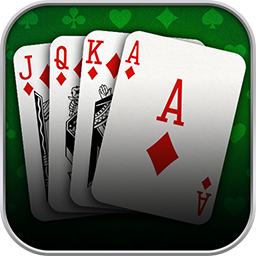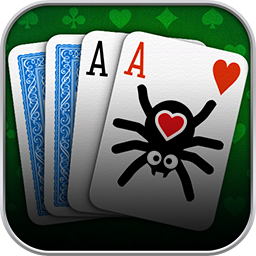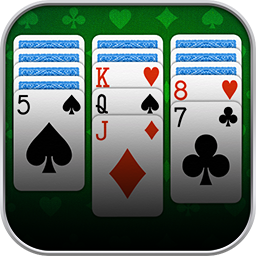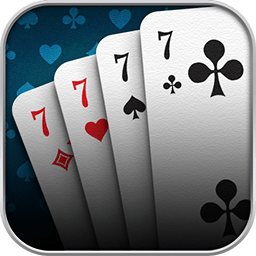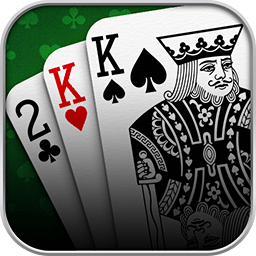Quickly read up on all Pinochle terms here! After all, this game is so detailed that you will need to look up a word here and there. To make quick work of your searching, we compiled this alphabetical list. Please check our Pinochle manual and Pinochle Lessons for detailed info and relations of these terms.
Ace:
That is the highest card rank in Pinochle.
Acorns:
This is one of four suits in the Württemberg pattern. It parallels Clubs in French-suited patterns like the American pattern.
American (Custom Rule):
The American way of playing Pinochle brings multiple rule changes, which you can best read about in the overview in our Pinochle Rules. Among other things, you are using more cards (see Bigger Deck), adjusted pip values, and additional melds. This rule cannot be combined with Durch, Untendurch, or Calling.
American Pattern:
This is the pattern traditionally used for playing Pinochle in English-speaking regions. It has the French suits Clubs, Spades, Hearts, and Diamonds which are different from the suits in the Württemberg pattern. The two pattern types also differ concerning a few ranks.
Bells:
This is one of four suits in the Württemberg pattern. It parallels Diamonds in French-suited patterns like the American pattern.
Bidding:
After dealing, all players evaluate their hand cards: How many points can you score by melding and trick-taking? Now, you go counter-clockwise bidding, raising values or passing. The highest bidder wins and becomes the declarer. They must now reach their bid value in this round or receive penalty points.
Bid Value:
The score that the declarer wins the bidding with is their bid value. If the declarer does not reach their bid value by the end of the round, twice the bid value will be subtracted from their score. All their points from melds are voided as well. The declarer can forfeit the round while declaring the trump suit in order to reduce the penalty.
Bigger Deck (Custom Rule):
This custom rule adds the Sevens to the deck, resulting in 48 playing cards in total. When you are playing with the custom rule American, the Nines are in use instead.
Binokel:
That is the German name of the Pinochle game. German Pinochle rules are the default at the Pinochle Palace. Using various custom rules, especially American, you can tailor the game to your preferences.
Blanks:
Cards scoring zero eyes are referred to as blanks in many card games. In Pinochle, blanks enter the game only with the custom rule Bigger Deck.
Calling (Custom Rule):
With this custom rule, the declarer may call a card they are lacking after discarding the kitty. You can only call cards that make sense: Each card exists twice. And when calling a card, you cannot have both of them in your hand or the kitty, respectively. The other players check counter-clockwise who has the called card. The first one must surrender it and will be compensated with another card from you. The bid value automatically rises to 400 when you employ calling.
Clubs:
This is one of four suits in the American pattern. It is paralleled by Acorns in the Württemberg pattern.
Cross Pinochle:
That is four-player Pinochle, wherein the players facing each other form a team. The points of both players in one team are tallied. The two teams play – virtually in a crosswise direction – against each other.
Custom Rules:
When creating a table at the Pinochle Palace, you can adjust the game to your liking. Choose from the rules Bigger Deck, Durch, Untendurch, Calling, No Kitty, Must Beat Trump, American, Training, Trading, and Half Penalty.
Dealer:
That is the player position before the forehand in the turn-order. As the dealer, you shuffle and deal the cards. At the beginning of a table, the dealer is determined at random. Each round, that position moves one seat so that everyone is the dealer an equal number of times.
Deck:
Pinochle uses two decks of cards with four suits: Clubs, Spades, Hearts, and Diamonds. The ranks used in Pinochle in descending order are Ace, Ten, King, Queen, and Jack, which have specific pip values. This makes 40 cards in total. When using custom rules, Sevens or Nines can be added to the game. They are blanks and do not award any points. In each case, this results in 48 cards in the game.
Declarer:
By winning the bidding, you become the declarer. You get to pick up and then discard the kitty and declare the trump suit. You could also call a card and declare a Durch or Untendurch game when using certain custom rules. As declarer, you must reach your bid value by the end of the round. Otherwise, you overbid and face the penalty for losing.
Diamonds:
This is one of four suits in the American pattern. It is paralleled by Bells in the Württemberg pattern.
Discard the Kitty:
After adding the kitty to their hand, the declarer must discard as many cards to reach the same number of hand cards as the other players. The discarded cards cannot be used for melds or trick-taking, but their eyes count for the declarer after they take their first trick.
Diss:
That term refers to the Seven or Nine of the trump suit. When using the custom rule Bigger Deck, that card can be melded, scoring ten points. Diss goes back to the French word dix for ten.
Double Pinochle:
This meld format consists of both Jacks of Diamonds and both Queens of Spades. It scores 300 points.
Double Run:
This meld format is made up of all ten cards of one suit. When using the custom rule Bigger Deck, the Sevens or Nines cannot be included in a run or double run. The double run scores 1,500 points.
Durch (Custom Rule):
By activating this custom rule, the game type Durch is added to the declarer’s game options. In that game type, there is no trump suit, the melding phase is skipped, and the declarer must win all tricks. If they succeed, they win 1,000 points for their team. If they fail, they will lose 1,000 points instead.
Eight of a Kind:
This is a meld format made up of all Aces, Tens, Kings, Queens, or Jacks in the game. It scores 1,000 points. If you play with the custom rule Bigger Deck, eight 7s can also be melded for 1,000 points.
Eyes:
Each card has a certain value. Those are counted in eyes and are relevant when evaluating the taken tricks. Aces score 11 eyes, Tens score 10 eyes, Kings 4, Queens 3, and Jacks 2 eyes. Sevens and Nines are blanks and score no eyes. In total there are 240 eyes in the game. Eyes are also referred to as pip values.
Forfeit:
When the declarer does not think they can reach their bid value after picking up the kitty, they can forfeit their hand to avoid losing more points. In Cross Pinochle, the number of points the partner could reach with melds and tricks should be considered as well. When forfeiting, the trump suit is declared as well – for example: “Forfeiting in Bells.” Then, the forfeiter’s bid value is subtracted from their score. If they played and overbid, they would lose twice that much. In contrast to their opponents, they do not get to meld. In Cross Pinochle, the forfeiter’s partner does not get to meld either. Forfeiting is sometimes called going out.
Four of a Kind:
This meld format consists of four cards of the same rank but different suits – Aces (100 points), Kings (80 points), Queens (60 points), or Jacks (40 points). The four Tens and the four blanks in a game with a bigger deck are no valid meld.
German Pinochle:
See Binokel.
Go Out:
See Forfeit.
Go Set:
See Overbid.
Green:
This is one of four suits in the Württemberg pattern. It parallels Spades in French-suited patterns like the American pattern. Sometimes, it is referred to as Leaves.
Half Penalty (Custom Rule):
When the declarer does not make their bid, they now lose the number of points they bid instead of double the number.
Hearts:
This is one of four suits in the American pattern as well as the Württemberg pattern.
Kitty:
After dealing the cards to all players, the remaining cards are put on the table face-down. This stack is the kitty. After bidding, the declarer adds it to their hand and then discards the same number of cards. After that, the declarer can decide to either forfeit their hand or declare the game.
Lead:
See Forehand.
Leaves:
See Green.
Marriage:
This meld format is made up of a King and a Queen of one suit. It usually scores 20 points, but 40 points in the trump suit.
Meld:
Melds are specific combinations of cards that score additional points if you take at least one trick. Melds are announced during the melding phase after bidding and before the trick-taking. Valid meld formats at the Pinochle Palace are Pinochle, double Pinochle, four of a kind, eight of a kind, run, double run, pair, and diss. We compiled detailed information on melds in the respective Pinochle Lesson.
Melding:
After declaring the trump suit or game mode, the declarer starts to meld specific combinations (see Meld). The cards of the melds are shown to all players. Then, the other players follow counter-clockwise. The points you score by melding are added to your final score of the round if you can take at least one trick in that round. After the melding is completed, the trick-taking starts.
Must Beat Trump (Custom Rule):
With this custom rule, trick compulsion applies to the trump suit only.
Nine:
Among other effects, the cards with rank Nine are added to the game only when using the custom rule American. They are blanks, so their pip value is zero. But you can meld the Nine in the trump suit as the diss.
No Kitty (Custom Rule):
With this custom rule, there is no kitty for the declarer to pick up. You cannot use this rule in a game of three with basic rules. You need four players, the additional rule Bigger Deck, or both.
Ober:
That is a rank in German card patterns. It parallels the Queen in the American pattern. An Ober is worth 3 eyes.
Overbid:
That is the diagnosis if the declarer does not reach their bid value by the end of a round. In that case, they automatically lose the round, and double their bid value is turned into penalty points. In Cross Pinochle, that also goes for the declarer’s teammate. The other players get their usual points for melds and tricks as well as ten bonus points per player each. Having overbid is sometimes referred to as going set.
Pair:
See Marriage.
Pinochle (Game):
At the Pinochle Palace, the term Pinochle refers to the German way of playing unless clearly stated differently. That rule set differs from American Pinochle in a few points. No worries, our comprehensive game help and manual will easily guide you through our default rules. And if you like, you can play with an American rule set by using custom rules.
Pinochle (Meld):
This is a meld format made up of each one Jack of Diamonds and Queen of Spades. It scores 40 points. Two Pinochles together make up a Double Pinochle, which scores 300 points.
Pip Values:
See Eyes.
Points:
See Scoring.
Rank:
The ranks Ace, Ten, King, Queen, and Jack each occur twice in all four suits in Pinochle. Using custom rules, the ranks Seven or Nine can be added. Using the German pattern, the Queens turn into Obers and the Jacks into Unters.
Round:
At a table of Pinochle, several rounds can be played. A round ends with the scoring after the last trick was taken. Each round’s scores are collected to determine the total score of a table.
Run:
This meld format is made up of one card of each rank in one suit – five cards in total. It usually scores 100 points, but 150 points in the trump suit. Though cards can be used for several melds, the marriage of King and Queen embedded in a run cannot be melded additionally! Sevens or Nines from the Bigger Deck never belong to any run.
Scoring:
When a round ends, the points scored by melding and the eyes collected by trick-taking are tallied – in a game of three, individually, in Cross Pinochle, by team. The declarer checks if they reached their bid value. Negative scores can come up due to forfeiting or losing games by overbidding. For the final scoring of a table, the results of all rounds are summed up by player or team. The player or team with the highest total score wins the table!
Seven:
Cards of the rank Seven are added to the Pinochle game only when using the custom rule Bigger Deck. They are blanks, so their pip value is zero. The Seven of trump is the Diss and can be melded for 10 points. When playing with the custom rule American, the Nines are added instead.
Spades:
This is one of four suits in the American pattern. It is paralleled by Green in the Württemberg pattern.
Suit:
In Pinochle, every rank occurs twice in each of the four suits. The Pinochle suits are Clubs, Spades, Hearts, and Diamonds. They correspond to the suits Acorns, Green, Hearts, and Bells of the Württemberg pattern, which is traditionally used in German Pinochle.
Suit Compulsion:
When playing cards to a trick, the suit of the trick’s first card must be followed, i.e., a card of the same suit must be played. Trick compulsion must always be complied with as well. When you do not have a fitting card of the required suit, trump compulsion comes into play.
Table:
At the Pinochle Palace, you play at tables. Each table’s number of players and rounds, the bet, and active custom rules are determined beforehand. After the last round, the final scores are determined, and you return to the lobby. If a Premium player is among you, you get the chance to play another table with the same players under the same conditions.
Team:
In Cross Pinochle, the two players sitting opposite one another join forces. Each player’s points from melds and tricks count for the whole team.
Trading (Custom Rule):
This rule is not available in a game of three. In four-player Pinochle, trading eliminates the kitty by dealing all cards to the players. After the declarer announces trump, their partner chooses four cards to hand over to the declarer face-down. After picking them up, the declarer returns any four cards from their hand face-down as well.
Training (Custom Rule):
With this custom rule, the results of the table do not affect the league. You keep collecting experience points, though.
Trick:
A set of three or four cards that each player contributes played one by one during the game’s trick-taking phase is one trick. Thus, the trick-taking phase consists of nine to 16 tricks, depending on the number of players and active custom rules. The player contributing the strongest card gets to take the trick and begin the next one. When two players play the same card, the first one wins the trick. If a player or team does not take a single trick in a round, their scores from melds are void. Taking the last trick of the round yields ten additional points.
Trick Compulsion:
If you can take the trick, you must do so. This means if you have a higher card of the played suit, you are obliged to play it. If you do not have a card matching the suit, trump compulsion comes into play.
Trick-Taking:
That is the main phase of a round. It ensues after the declarer determined the game mode and all players made their melds. During trick-taking, you play your hand cards in order to gain as many points as possible for yourself or your team. This phase consists of nine to 16 tricks, depending on the number of players and active custom rules.
Each player must contribute one card per trick. The player right to the dealer gets to start the first trick. Then, the turn order goes counter-clockwise. The player contributing the strongest card wins this trick and starts the next one. The strongest card is determined by card order and the selected trump suit. During trick-taking, suit compulsion, trick compulsion, and trump compulsion are active. You find detailed info on trick-taking in the Pinochle School.
After taking the last trick, it is time to evaluate the round (see Scoring).
Trump:
Any card of the trump suit automatically beats any card of the other suits. The trump suit is announced by the declarer, the player who won the bidding.
Trump Compulsion:
If you cannot follow the suit of a trick and have a trump card, you must play it. That also applies when a higher trump card was played already. That means suit compulsion comes before trump compulsion.
Untendurch (Custom Rule):
By activating this custom rule, the game type Untendurch is added to the declarer’s game options. There is no trump suit in that game type, the melding phase is skipped, and the declarer must not win a single trick. In a four-player game, the declarer’s team partner is allowed to win tricks. Only the tricks of the declarer are relevant. If they succeed, they win 1,000 points for their team. If they miss the goal, they will lose 1,000 points instead.
Unter:
That is a rank in German card patterns. It parallels the Jack in the American pattern. An Unter is worth 2 eyes.
Württemberg Pattern:
This is one of the German patterns for playing cards and traditionally used for playing Pinochle in Germany. It has the same suits as the German, Bavarian, and Franconian decks. The differences among these patterns mostly concern style. The suits are Acorns, Green, Hearts, and Bells. They use the ranks Unter and Ober instead of Jack and Queen while the other ranks remain the same.
Who Played First, Wins:
Since Pinochle uses two decks of cards, two cards of the same rank and suit can occur in the same trick. If these are the highest cards in the trick, the one played first is stronger and wins the trick.

